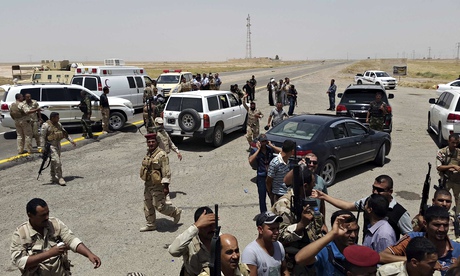
Iraqi security forces and volunteers on the outskirts of Diyala province. Photograph: Reuters
Iran has sent 2,000 advance troops to Iraq in the past 48 hours to help tackle a jihadist insurgency, a senior Iraqi official has told the Guardian.
The confirmation comes as the Iranian president, Hassan Rouhani, said Iran was ready to support Iraq from the mortal threat fast spreading through the country, while the prime minister, Nouri al-Maliki, called on ordinary Iraqis to take up arms in their country's defence.
Addressing the nation on Saturday, Maliki said rebels from the Islamic State of Iraq and the Levant (Isis) have given "an incentive to the army and to Iraqis to act bravely". His call to arms came after reports surfaced that hundreds of young men were flocking to volunteer centres across Baghdad to join the fight against Isis.
Rouhani also made reference to the fact Tehran was cooperating with its old enemy Washington to defeat the Sunni insurgent group – which is attempting to ignite a sectarian war beyond Iraq's borders.
The Iraqi official said 1,500 basiji forces had crossed the border into the town of Khanaqin, in Diyala province, in central Iraq on Friday, while another 500 had entered the Badra Jassan area in Wasat province overnight. The Guardian confirmed on Friday that Major General Qassem Suleimani, the head of the Iranian Revolutionary Guards elite Quds Force, had arrived in Baghdad to oversee the defence of the capital.
There is growing evidence in Baghdad of Shia militias continuing to reorganise, with some heading to the central city of Samarra, 70 miles (110km) north of the capital, to defend two Shia shrines from Sunni jihadist groups surrounding them.
The volunteers signing up were responding to a call by Iraq's most revered Shia cleric, the Iranian-born grand ayatollah Ali al-Sistani, to defend their country after Isis seized Mosul and Saddam Hussein's hometown of Tikrit in a lightning advance. Samarra is now the next town in the Islamists' path to Baghdad.
"Citizens who can carry weapons and fight the terrorists in defence of their country, its people and its holy sites should volunteer and join the security forces," Sheik Abdul-Mahdi al-Karbalaie, Sistani's representative, said on Friday in a sermon at the holy Shia city of Kerbala.
He warned that Iraq faced great danger and that fighting the militants "is everybody's responsibility, and is not limited to one specific sect or group," Associated Press reported. Karbalaie's comments have consistently been thought to reflect Sistani's views.
A colonel from the military command responsible for Samarra said Iraqi security forces were preparing a counter-offensive on Saturday. The army colonel, whom Maliki announced had been granted "unlimited powers" by the Iraqi cabinet, said reinforcements from the federal police and army arrived on Friday, according to AFP.
The officer said the reinforcements were for a drive against areas north of the city, including Dur and Tikrit, that militants seized in a spectacular assault this week. Security forces were awaiting orders to begin, the colonel said.
Sunni residents of west Baghdad said on Saturday that they had been menaced by Shia militias who taunted them with anti-Sunni chants. Baghdad has remained in virtual lockdown for the past three days as jihadists from the Isis threatened to storm the capital. However, Saturday morning saw relative normality return to deserted streets, with many residents returning to shops to gather stockpiles.
Residents of the capital offered little reaction to Barack Obama's statement late on Friday on which he appeared to condition renewed US military support on Iraqi leaders first making efforts to pull the country back from the brink.
The US and Iran, foes throughout the US occupation of Iraq, share a common interest in defeating Isis, and Iran has so far expressed no opposition to US threats to send military support to the beleaguered Maliki.
Meanwhile, Willaim Hague has held talks with the Turkish foreign minister, Ahmet Davutoglu, "urgently to co-ordinate approaches to the instability in Iraq and links to Syria conflict", he said on Twitter. Britain is also to give £3m ($5.1m) of aid to Iraq as the first step in dealing with the humanitarian consequences of the insurgency by Isis.
The international development secretary, Justine Greening, said the initial tranche of emergency funding would allow agencies to supply water, sanitation, medicine, hygiene kits and basic household items

No comments:
Post a Comment